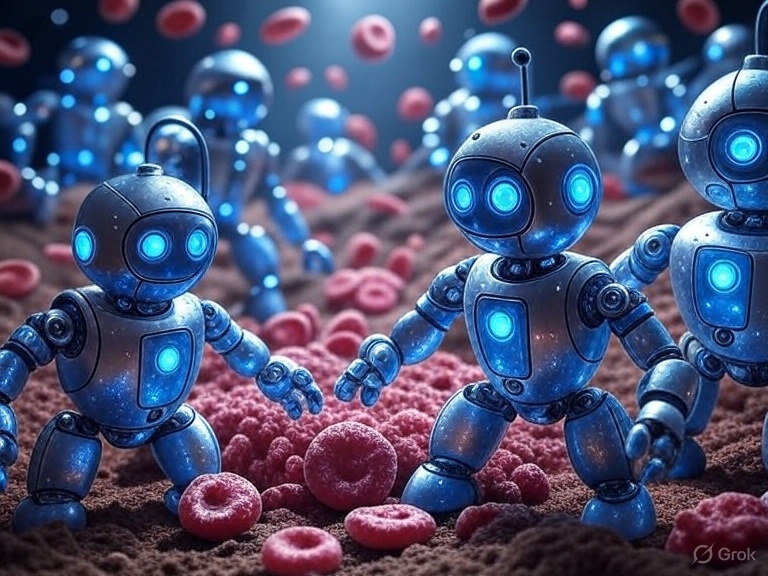Medicine has always evolved with technology—from herbal remedies to antibiotics, vaccines, and robotic surgeries. But what if the next leap was so revolutionary that traditional medicine became obsolete? Imagine a world where nanobots—tiny machines smaller than a human cell—replaced pills, injections, and even surgeries. Would this usher in a golden age of health, or would it create unforeseen risks?
The Rise of Nanobot Healthcare
Nanobots, or nanoscale robots, are designed to perform tasks at the cellular and molecular level. Scientists are already experimenting with prototypes capable of detecting cancer cells, repairing tissues, and delivering drugs with pinpoint accuracy. If nanobots completely replaced medicine, the healthcare industry as we know it would be transformed forever.
Instead of visiting pharmacies, patients might receive a swarm of nanobots programmed to maintain health from within. These tiny robots could patrol the bloodstream, detect illnesses in their earliest stages, and repair damage before symptoms even appear.
How Nanobots Could Replace Traditional Medicine
Here are some of the ways nanobots might take over every aspect of medical care:
- Early Disease Detection – Nanobots could constantly scan the body for abnormalities like cancerous mutations, viruses, or clogged arteries.
- Targeted Treatment – Unlike pills that spread chemicals throughout the body, nanobots could deliver medicine directly to diseased cells, reducing side effects.
- Surgery Without Scalpels – Nanobots could repair tissues, clear blockages, or even rewire neurons, eliminating the need for invasive surgery.
- Anti-Aging and Regeneration – These microscopic machines might reverse cellular damage, slow aging, and even regenerate lost tissues or organs.
- Personalized Medicine – Each nanobot swarm could be programmed to adapt to a person’s DNA and medical history, ensuring treatments are fully individualized.

The Benefits of a Nanobot-Driven World
If nanobots replaced medicine entirely, society could see life-changing advantages:
- Longer Lifespans – Diseases like cancer, diabetes, and Alzheimer’s might become manageable or even curable.
- Reduced Healthcare Costs – Over time, automated nanobot treatments could reduce the need for expensive surgeries and hospital stays.
- Global Health Equity – With mass production, nanobots could be distributed worldwide, giving developing regions access to advanced healthcare.
- Pandemic Control – Nanobots could identify and neutralize new viruses before they spread, preventing global health crises.
This would mark the dawn of a new era where disease and disability are no longer barriers to human potential.
The Risks and Ethical Concerns
However, a world dominated by nanobots wouldn’t be without challenges:
- Malfunctioning Nanobots – A simple software bug could cause nanobots to attack healthy cells or misdiagnose conditions.
- Overdependence on Technology – Humanity could lose resilience if health becomes entirely reliant on machines.
- Privacy Invasion – Nanobots constantly scanning your body might also monitor your lifestyle, raising ethical concerns about surveillance.
- Weaponization – If hacked, nanobots could be turned into biological weapons capable of harming individuals or populations.
- Socioeconomic Divide – At least initially, nanobot treatments might only be available to the wealthy, deepening inequality.
The shift from medicine to nanotechnology could therefore become one of the greatest debates in human history.
How Would Society Change?
- Hospitals Transformed – Instead of traditional wards, hospitals might become tech labs where nanobots are monitored and updated.
- Doctors as Programmers – Physicians could transition from prescribing drugs to coding and managing nanobot swarms.
- Pharmaceutical Industry Collapse – The trillion-dollar drug industry could shrink drastically as pills, syrups, and injections become obsolete.
- Insurance Revolution – Health insurance might shift from covering treatments to covering software updates for nanobots.
This evolution would not only affect healthcare but also reshape the global economy.
Could Nanobots Make Us Immortal?
One of the most controversial debates surrounding nanobot medicine is immortality. If nanobots could continuously repair damaged cells and prevent aging, humans might live far beyond current lifespans.
However, immortality raises its own questions:
- Would overpopulation become a crisis?
- Would only the rich have access to eternal life?
- How would society adapt if death itself became rare?
Nanobots could make humanity face existential questions that traditional medicine never had to answer.
The Road Ahead
Today, nanobot technology is still in its early stages. Researchers are making breakthroughs, but practical, widespread medical nanobots may still be decades away. Nonetheless, the possibility of a world where nanobots replace medicine entirely is no longer science fiction—it’s a real scientific pursuit.
Preparing for this future means addressing ethical, technological, and societal challenges now, before the first swarm of medical nanobots enters a human body.
Conclusion
If nanobots replaced medicine entirely, humanity would stand at the threshold of its greatest health revolution. Diseases could vanish, lifespans could double, and personalized medicine could become the norm. Yet, the risks—ranging from hacking to inequality—cannot be ignored.
The real question is not whether nanobots can replace medicine, but whether humanity is prepared to responsibly embrace a world where healing no longer comes from pills or surgery—but from armies of microscopic machines.